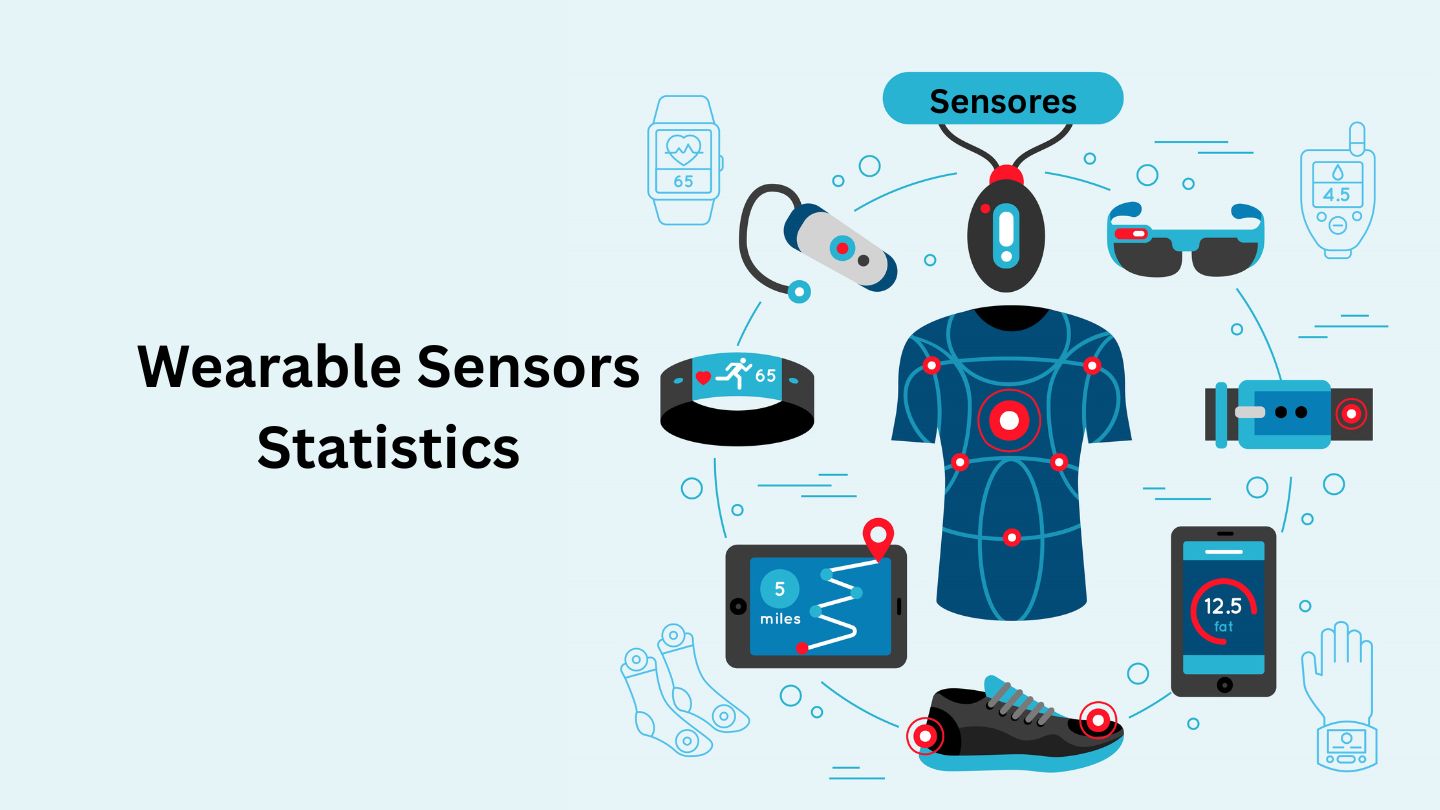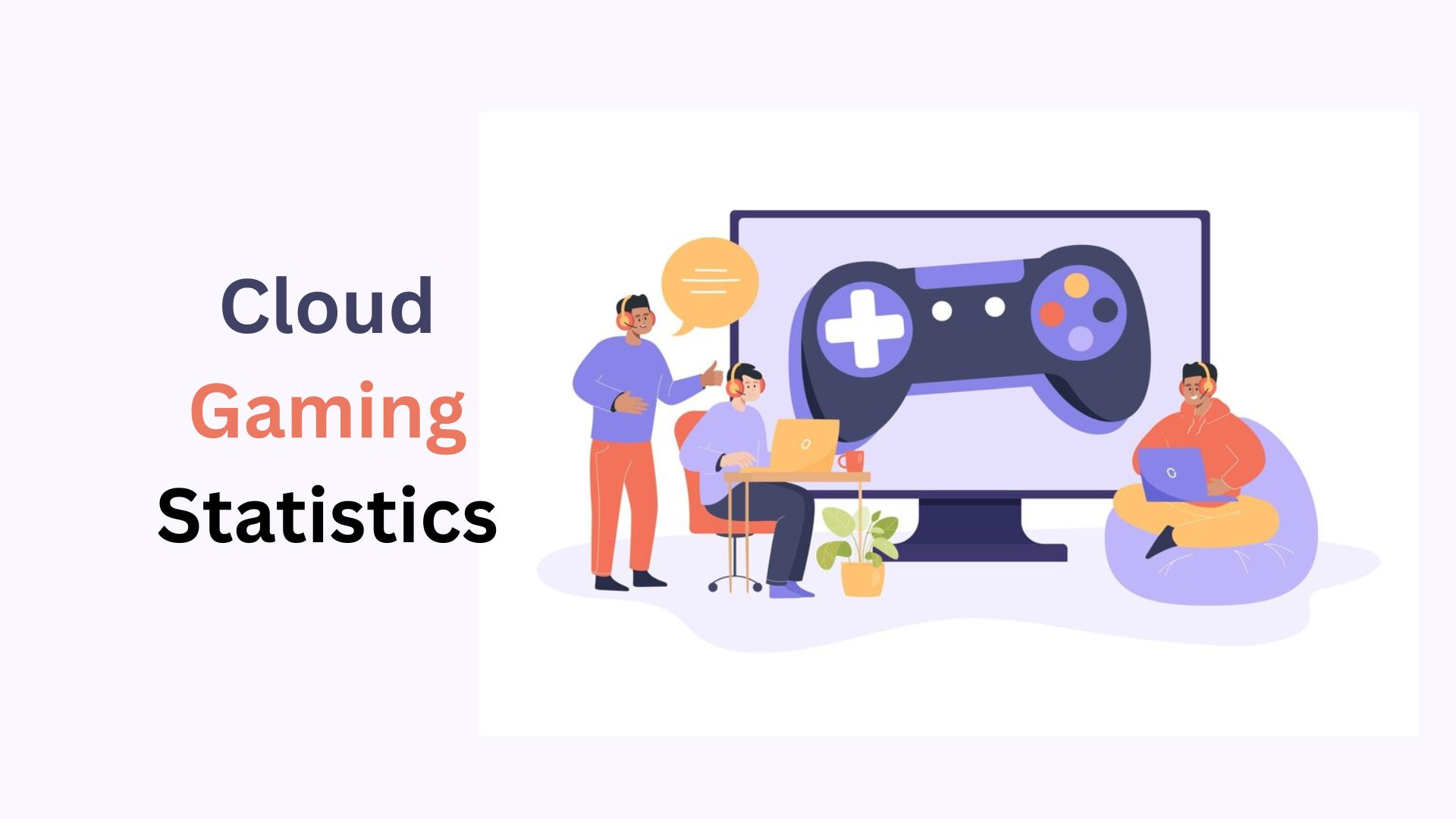Generation Alpha Statistics and Facts (2025)

Updated · Mar 20, 2025


TABLE OF CONTENTS
- Introduction
- Editor’s Choice
- What is Generation Alpha?
- Characteristics of Generation Alpha
- General Generation Alpha Statistics
- Generation Alpha Career and Education Statistics
- Generation Alpha Parents Statistics
- Social Media and Generation Alpha Statistics
- Generation Alpha Population Statistics
- Generation Alpha Entertainment Statistics
- Conclusion
Introduction
Generation Alpha Statistics: Generation Alpha, encompassing individuals born between 2010 and 2024, represents a cohort deeply immersed in digital technology from an early age. This generation is projected to reach a global population of nearly two billion by 2025, with over 2.5 million members born each week.
In the United States, Generation Alpha constitutes approximately 13% of the population. Their upbringing is characterized by ubiquitous access to smartphones, tablets, and streaming services, influencing their consumption habits and entertainment preferences. Notably, 84% of Generation Alpha engages with content on YouTube, and 51% utilizes TikTok. Their significant consumer influence is evident, with an estimated spending power of USD 28 billion, and an average weekly allowance of USD 22, primarily allocated to toys and snacks.
As Generation Alpha matures, their technological proficiency and digital nativity are anticipated to reshape various sectors, including education, entertainment, and the workforce, underscoring their potential impact on future societal and economic landscapes.
Editor’s Choice
- Almost 35% of parents now skip baby food purees and start their Gen Alpha babies on solid foods right away, following the baby-led feeding trend.
- 31% of Gen Alpha kids regularly eat popular plant-based foods like oat milk and Beyond Beef several times a week.
- Nearly 84% of Gen Alpha children watch videos on YouTube, and 51% are already using TikTok.
- 56% of Gen Alpha parents purchase new foods for their kids after seeing them on TV or the Internet.
- 35% of restaurant and food service businesses say Gen Alpha customers are very important to their success.
- Generation Alpha Statistics stated that over 50% of Gen Alpha kids start using social media before they turn 12.
- YouTube is their favourite platform, with around 85% of them watching it often.
- TikTok follows next, and nearly 60% of Gen Alpha kids who have social media use it.
- On average, they spend 4.5 hours daily on screens.
- Roughly 40% own their first smartphone by age 10.
- Nearly 73% of parents worry about their kids’ social media use.
- Generation Alpha Statistics stated that almost 75% of them are active on gaming-focused platforms like Roblox.
- Mostly, 65% prefer watching videos over reading.
- 65% prefer sending voice messages rather than texting.
- Almost 55% use online learning platforms for homework help.
- Around 40% have made their videos.
- Parents monitor 75% of Gen Alpha’s social media use.
- 45% engage with music-related content on social media.
- 80% prefer using visuals over text when communicating online.
- Most Gen Alpha kids use 3 to 4 different social media platforms regularly.
What is Generation Alpha?
Generation Alpha (Gen Alpha) comes after Generation Z and before Generation Beta. Experts have different opinions on the exact birth years, but most agree that Gen Alpha includes kids born from the early 2010s to the mid-2020s. The name comes from “Alpha,” the first letter of the Greek alphabet. This is the first generation born entirely in the 21st century. Most Gen Alpha children have Millennials or older Gen Z parents.
This generation is growing up during a time when birth rates are dropping in many countries. They also spent their early years during the COVID-19 pandemic, which affected their childhood. Unlike older generations, they prefer social media, streaming services, and digital entertainment instead of traditional TV. Technology is also changing how they learn in school and interact with the world. Studies show that problems like too much screen time, allergies, and obesity have increased among kids since the late 2010s.
Characteristics of Generation Alpha
Gen Alpha may have some similarities with Gen Z, but they also have unique qualities that make them different. Here are some of their key traits:
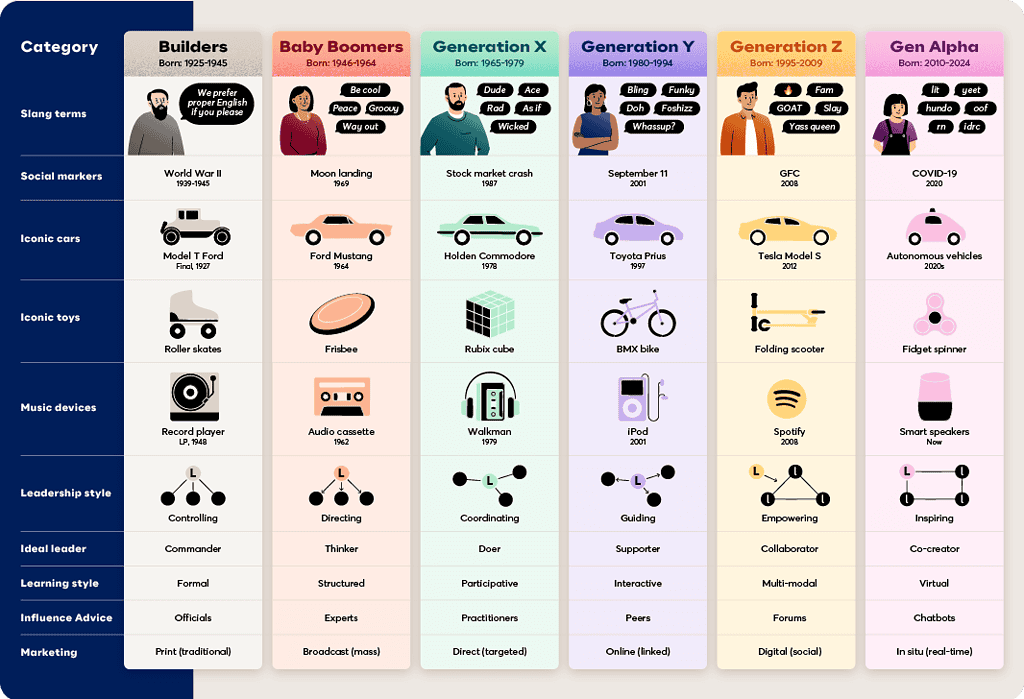
(Source: mccrindle.com.au)
- Always Online: Gen Alpha spends most of its time on the Internet. Technology is deeply woven into their daily lives, shaping how they interact with the world.
- Independent: They like to make their own decisions and control their online presence. They also expect their personal choices and needs to be acknowledged.
- Love for Visual Content: Videos are their favourite way to consume content. Playing video games helps them develop better hand-eye coordination and the ability to multitask easily.
- Tech Experts: Growing up with technology, they quickly learn to use new gadgets and software, making online learning more natural and creating endless opportunities for them.
- Diverse and Inclusive: Their diversity isn’t just about race and gender—it includes their interests, lifestyles, and opinions, making them more accepting and open to different perspectives.
General Generation Alpha Statistics
- Nearly 45% have learned something new from online tutorials.
- About 30% of older Gen Alpha kids use Instagram.
- Almost 80% of their time online is spent on mobile devices instead of computers.
- Generation Alpha Statistics stated that 55% enjoy making their content rather than just watching.
- By 2024, Gen Alpha will make up 13% of the U.S. population.
- A baby is born in the United States every 9 seconds, increasing Gen Alpha’s numbers by 6.66 babies per minute.
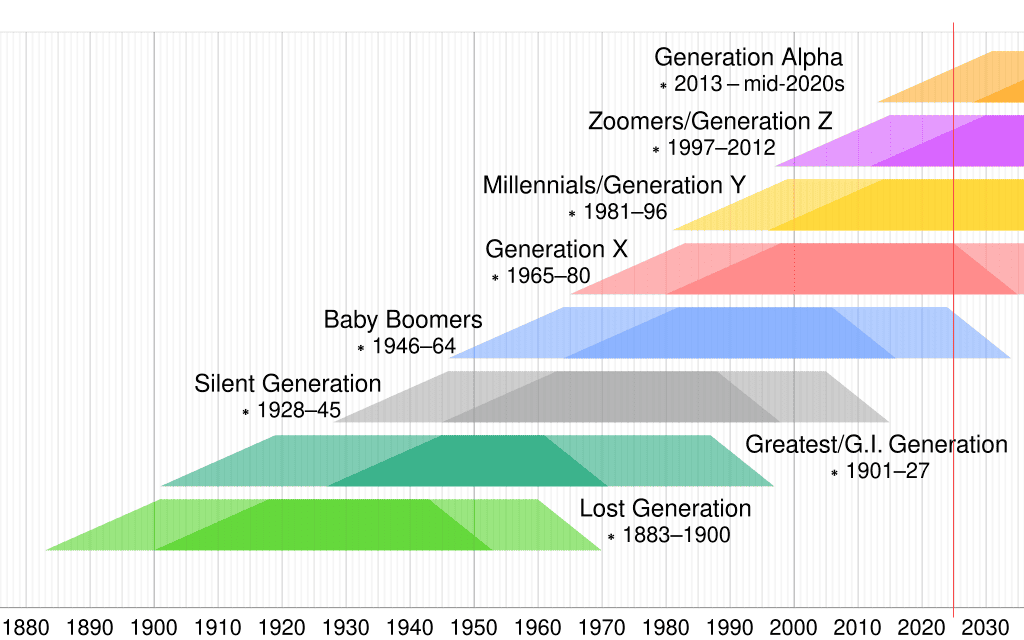
(Source: en.wikipedia.org)
- Around 65% of jobs Gen Alpha will have in the future do not exist today.
- Gen Alpha is known as the most diverse generation in U.S. history.
- Generation Alpha Statistics stated that 60% of Gen Alpha believes that everyone should be treated fairly.
- Most Gen Alpha kids get introduced to social media by age 8.
- 90% of them use interactive features on social media.
- 40% of their social media activity involves educational content.
- 70% regularly use filters and effects on social media.
- Gen Alpha spends about 2.5 hours a day on social media.
- Almost 85% of their time on social media is spent watching short videos.
- 60% of parents say their Gen Alpha kids use social media to be creative.
- Generation Alpha Statistics stated that 35% had taken part in social media challenges.
- 25% of older Gen Alpha kids use virtual reality social platforms.
- Nearly 50% prefer using GIFs and emojis to communicate.
- Watching gaming livestreams takes up 30% of their social media time.
- About 2.8 million Gen Alpha babies are born each week worldwide.
- The highest number of Gen Alpha births happened in India, China, and Indonesia.
- Their life expectancy is expected to be 16% higher than that of Millennials.
- 55% of Gen Alpha parents think their kids will receive a better and more advanced education than they did.
- Around 66% of Gen Alpha prefer to buy from companies that make a positive impact on the world.
- In the U.S., about 84% of Gen Alpha students use technology in school.
- Only 50% of Gen Alpha are expected to earn a college degree.
Generation Alpha Career and Education Statistics
- Gen Alpha is growing up in a time when education and jobs are changing quickly. Online learning and new technology are giving students more ways to study and build skills. When they start working, they’ll have career choices that don’t even exist yet.
- Generation Alpha Statistics stated that almost 50% of Gen Alpha is expected to graduate from college.
- They could become the most well-educated generation ever. Experts predict 90% will finish high school, compared to 80% of Gen Z.
- 72% of students worldwide use digital devices in school.
- The oldest Gen Alpha kids spent at least one full year in remote learning during the COVID-19 pandemic. Since then, technology has become a major part of education.
- 44% of students use devices given by their school, and 28% bring their own from home.
- 67% of fourth graders struggle with reading at their grade level, making it a big concern for teachers. Reading is important because kids need it to understand other school subjects. The number of students having trouble with reading has gone up 2% since 2019.
- About 2 out of 3 Gen Alpha kids will have jobs that don’t exist yet. New industries will appear, and many will work in areas like artificial intelligence (AI), blockchain, and advanced technology.
- Generation Alpha Statistics stated that 30% of Gen Alpha wants to help people or the planet in their future careers. Another 15% hope to turn their passions into full-time jobs.
- STEM jobs (science, technology, engineering, and math) are expected to grow by 10.8% in the next 10 years, compared to just 2.3% for other careers.
- By 2031, the oldest Gen Alpha workers will start their professional careers.
- The average STEM salary is $101,650 per year, while the average salary across all jobs is $46,680.
Generation Alpha Parents Statistics
- 70% of Gen Alpha’s parents are Millennials, while 21% belong to Gen X and 8% are Gen Z adults.
- 55% of parents think their kids will get a better education than they did, mainly because of easy access to learning resources and greater awareness.
- Many parents are committed to providing their children with the best educational opportunities they missed out on.
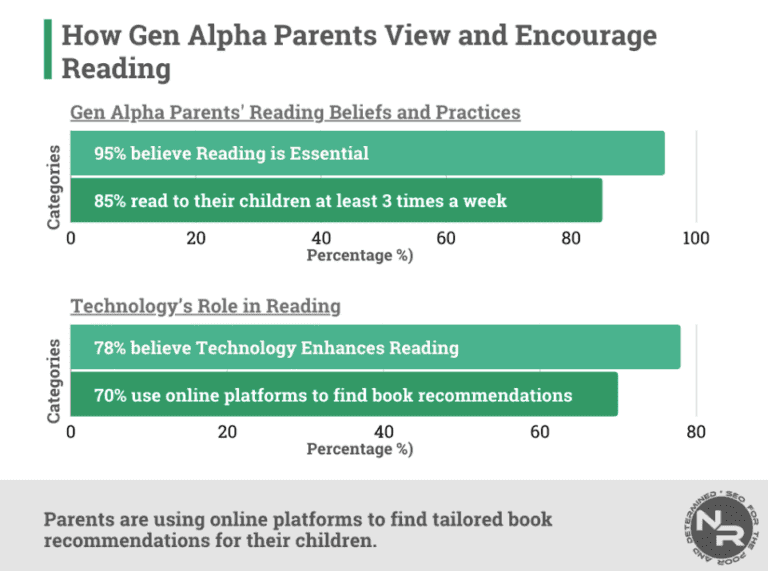
(Source: nikolaroza.com)
- Generation Alpha Statistics stated that 75% of Millennial parents want to keep their kids off social media for as long as possible.
- Also, 35% believe their child’s online history should be erased when they turn 18.
- 77% of Millennial parents prioritize spending time with their children over their careers.
- About 59% of Millennial moms and 49% of Millennial dads have either put their careers on hold or shifted focus from work, ensuring their kids get more attention and care.
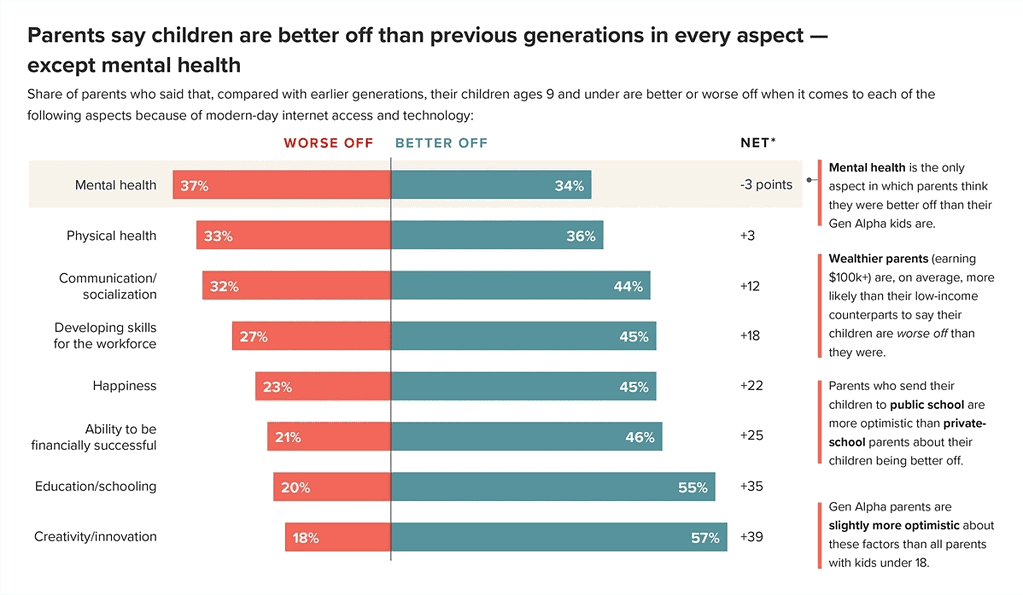
(Source: explodingtopics.com)
- Millennial dads are working on becoming more emotionally connected with their children, but many still need to improve their physical presence.
- 81% of Millennials believe happiness is more important than success.
- Among them, 45% of moms and 31% of dads think mental well-being matters more than anything else.
Social Media and Generation Alpha Statistics
- Kids in Generation Alpha are using smart devices at younger ages than any past generation.
- Generation Alpha Statistics stated that almost 43% of them have a tablet before age 6, and 58% own a smartphone before turning 10. Because of this, they start using social media early, developing preferences for different apps and platforms.
- YouTube is their top choice, with kids spending about 84 minutes per day watching videos that are both fun and educational.
- Unlike Gen Z, which uses social media mainly to connect with friends, Gen Alpha turns to YouTube to discover new brands and products.
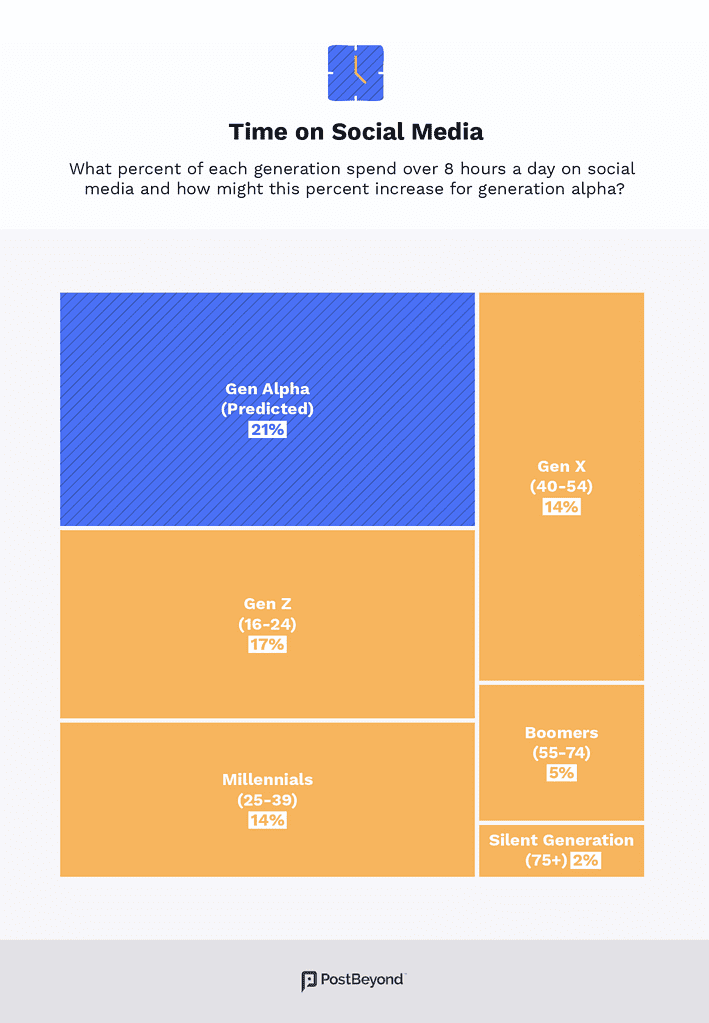
(Source: postbeyond.com)
- TikTok is also highly popular. In 2019, almost 50% of daily TikTok users were 14 years old or younger.
- Even though TikTok requires users to be at least 13 years old, many younger kids still manage to use it.
- Gen Alpha trusts online influencers almost as much as their own families when it comes to buying products.
- Instead of using Google or other search engines, they often look up information on social media.
- Gaming is also a huge part of their social media experience. Roblox is a favourite platform, allowing kids to create virtual worlds and play with friends online.
- Generation Alpha Statistics stated that over 36 million kids (ages 0-11) use the Internet, which is 11.6 million more than teenagers (12-17).
- 65% of Gen Alpha kids (ages 8-10) spend up to 4 hours daily on social media.
- In 2024, 44% of Gen Alpha used TikTok, making it more popular than traditional TV (39%).
- 30% of Gen Alpha spend more than 2 hours a day watching YouTube and YouTube Shorts.
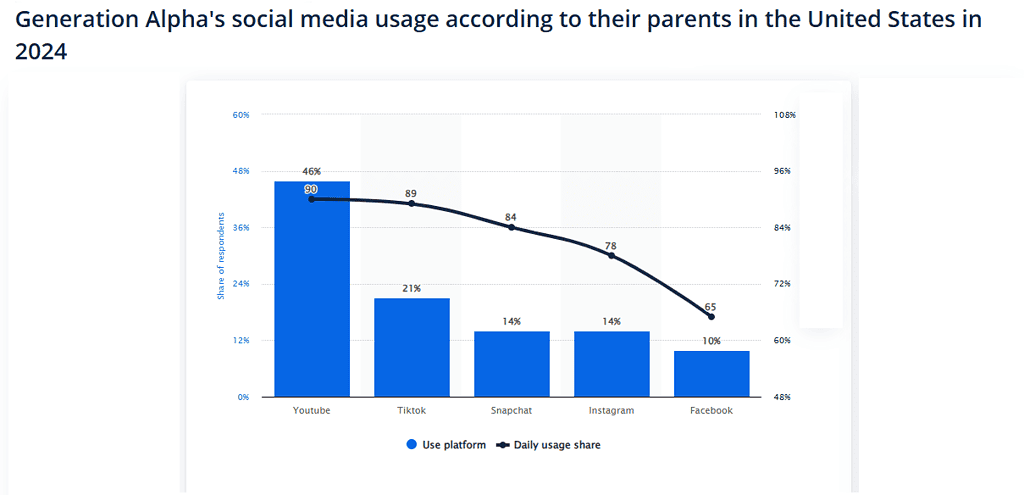
(Source: statista.com)
- In 2024, YouTube was the favourite social media platform among Generation Alpha kids in the U.S., based on a major survey of their parents.
- An impressive 90% of Gen Alpha YouTube users were found to access the app every day.
- 2 out of 3 kids (ages 6-8) search for Roblox videos on YouTube at least once a week.
- Because they are used to short, fast-paced videos, they might have trouble focusing for long periods.
- Teachers have noticed that some kids lose interest in non-digital activities, which may affect classroom behaviour and learning.
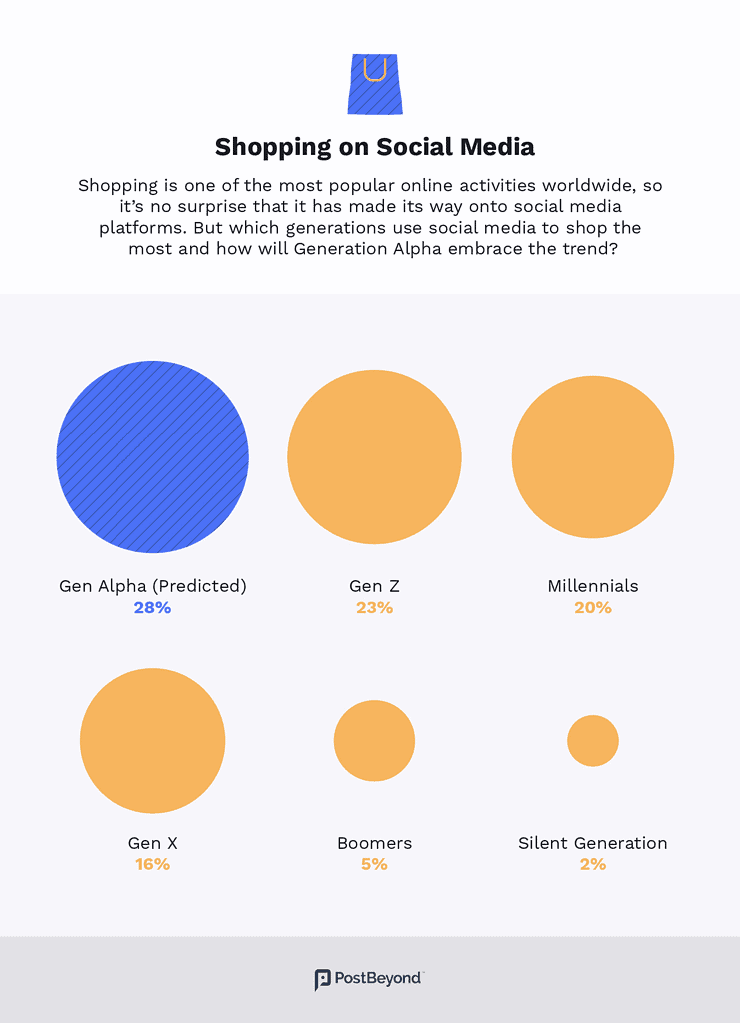
(Source: postbeyond.com)
- It’s still too soon to know exactly how social media affects Gen Alpha’s mental health, but research suggests that kids born during COVID-19 lockdowns struggle with social and emotional skills.
- Since the pandemic limited in-person interaction, many young kids spent more time on screens instead of socializing. As a result, some Gen Alpha kids now face challenges in basic social skills, which could create problems for parents and teachers in the future.
- Online learning and digital tools will help them access knowledge in new ways.
- However, parents must set limits on screen time to protect their children’s mental and social well-being.
Generation Alpha Population Statistics
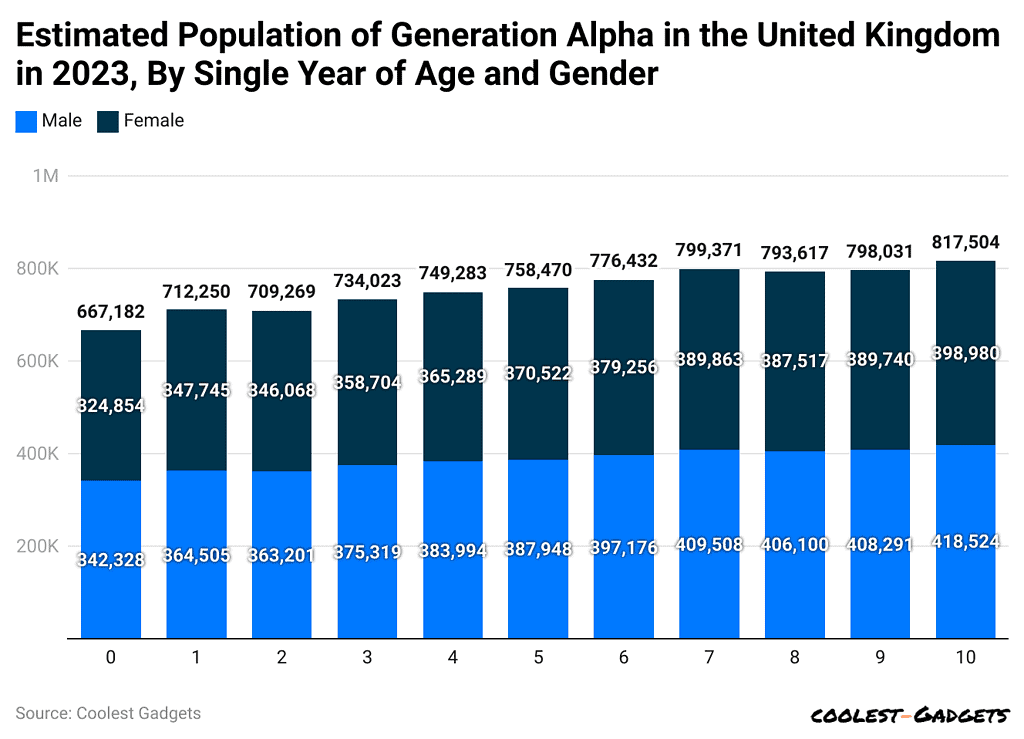
(Reference: statista.com)
- In 2023, the United Kingdom had about 8.3 million Gen Alpha members, ranging from newborns to ten-year-olds.
- The largest group was 10-year-olds, with 817,504 children, while the number of infants was lower, at 667,182.
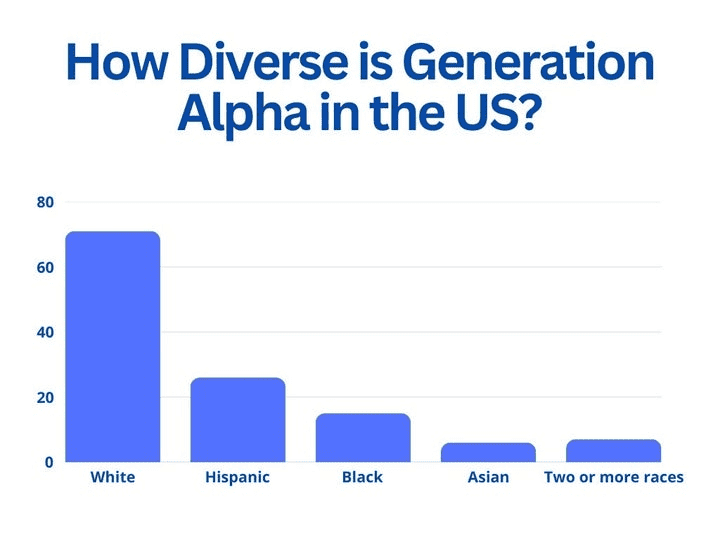
(Source: softonic.com)
- A survey on Generation Alpha in the United States showed the following ethnic distribution:
-
- White – 71%
- Hispanic – 26%
- Black – 15%
- Asian – 6%
- Multiracial (Two or More Races) – 7%
Generation Alpha Entertainment Statistics
- After spending two important years indoors during the pandemic, many Gen Alpha kids have developed a strong attachment to screens. They prefer to spend their free time playing video games and browsing social media apps.
- Kids between 8 and 12 years old spend about 4 hours and 44 minutes daily using screens.
- Teens aged 13 to 18 spend even more time, averaging 7 hours and 22 minutes per day.
- The use of audio-based content like podcasts and music has increased by 10% compared to 2022.
- Gen Alpha doesn’t just enjoy watching videos—they also listen to audio content.
- Many Gen Alpha kids prefer podcasts about comedy, self-improvement, and gaming.
- Generation Alpha Statistics stated that almost 11% of teens said posting on social media makes them feel happy.
- 19% believe social media helps them express their real-life struggles and experiences.
- Teenagers in Gen Alpha love going to the movies. They visit theatres 39% more than older generations to enjoy films on the big screen.
- On average, Gen Alpha has access to 4.2 streaming services.
- 59% of Gen Alpha kids say watching movies and TV shows is their favourite way to spend weekends.
- 50% of kids aged 8 to 11 consider watching TV their favourite after-school activity.
- Research from GWI reveals that Gen Alpha prefers TV shows related to music and dance:
-
- 34% enjoy dance-based shows.
- 33% like singing competition shows.

(Reference: demandsage.com)
- A large number of Gen Alpha kids prefer games that let them build and create, which makes gaming more engaging and boosts creativity.
-
- 43% of Gen Alpha players choose Roblox.
- 58% enjoy playing Minecraft.
- 40% prefer Fortnite.
- Generation Alpha Statistics stated that more than 73% of Gen Alpha go online for activities like gaming, watching videos, live streaming, and using social media.
- Since most of their screen time involves internet-based activities, they are heavily exposed to the digital world.
- Only 17% of Gen Alpha own a smartphone. While smartphones are widely available in homes and make it easier to play games, stream content, and browse social media, many Gen Alpha kids are too young to have full access to them.
Conclusion
Just like the generations before them, Gen Alpha is set to change the world of digital advertising with its unique preferences and behaviours. It is the first generation to grow up completely in the digital age, making its connection to technology, online videos, gaming, and social media stronger than ever—and it will only continue to grow as it gets older.
Understanding this fast-changing generation is crucial for businesses and marketers to building relationships as their spending power increases. This article has shed enough light on Generation Alpha Statistics.
Sources
FAQ.
Generation Alpha accounts for about 13% of the U.S. population, and their numbers are still increasing. This is the youngest generation, coming after Gen Z. While the exact time frame varies, Gen Alpha generally includes children born from the early 2010s to 2025.
It’s hard to say if Gen Alpha is more intelligent than Gen Z since intelligence has many aspects and is influenced by different things. However, Gen Alpha, born after 2010, is expected to be highly skilled with technology and quick to adapt because they have grown up using digital devices from a young age.

Saisuman is a talented content writer with a keen interest in mobile tech, new gadgets, law, and science. She writes articles for websites and newsletters, conducting thorough research for medical professionals. Fluent in five languages, her love for reading and languages led her to a writing career. With a Master’s in Business Administration focusing on Human Resources, Saisuman has worked in HR and with a French international company. In her free time, she enjoys traveling and singing classical songs. At Coolest Gadgets, Saisuman reviews gadgets and analyzes their statistics, making complex information easy for readers to understand.







